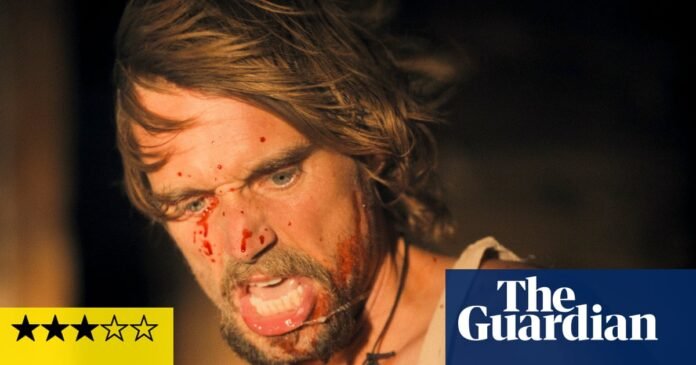Director Joshua Erkman’s feature debut manages to deliver an impressively creepy horror exercise that’s also a bit of a send-up of horror conventions. At the same time, it feels like a weird dodge into borderline-abstraction and unknowable mystery that drains all the realism away, making this a mannered film-making exercise. But there’s no denying the level of craft on show, or the original way Erkman throws together practitioners of highfalutin art-world discourse and skeevy low-lifes, with bloody results. In generic terms, it definitely feels of a piece with other recent highbrow-meets-lowbrow scare-’em-ups, the kind of grad-school horror you might see in the queer-eyed I Saw the TV Glow, David Lowery’s stripped-down A Ghost Story, or director Ari Aster’s Hereditary. In other words: interesting for sure, but perhaps a bit pretentious for hardcore gorehounds.
In A Desert, we first meet photographer Alex (Kai Lennox) as he drives around the desiccated terrain of California’s Yucca Valley, listening to smooth contemporary jazz on his fancy SUV’s sound system and pulling over to take pictures of abandoned buildings. He shoots his images on a fancy 8×10 inch apparatus that uses photographic plates that need to be exposed for 10 second intervals. His subjects include disused cinemas and the ghost town remains of abandoned military bases – although in a voicemail he leaves for his wife Sam (Sarah Lind) he suggests he might shift over into portraits for a while. Clearly, he’s not especially interested in the people who live here, although when the trailer-trash-style couple (Zachary Ray Sherman and Ashley Smith) in the motel room next door come a-knocking, offering turpentine-tasting hooch and a chance to party, Alex is too polite/weak to resist.
Not long after a blur of lapdance moves and lurid colours, all set to EDM, the film creates a caesura much like another well-known horror film that to name would spoil the main twist. Suffice it to say, after that things roll on and we follow different protagonists, this time Alex’s wife Sam and private detective Harold (David Yow) who find themselves drifting down the same lost highways of the valley.
Erkman, a sometime cinematographer himself, and director of photography Jay Keitel really nail the artbook view of the economically depressed west, a style that’s like the Americana of Joel Meyerowitz meeting the ruination porn of Yves Marchand and Romain Meffre. We are no doubt meant to infer that Alex and other visitors only see the exploitable aesthetics of area, photogenically surrendering to the forces of nature, and are blind to the real human evil that exists there – out in plain sight as the last shot confirms. It’s perhaps not a very profound message, but the visual and editing styles are swoony and most bewitching.




